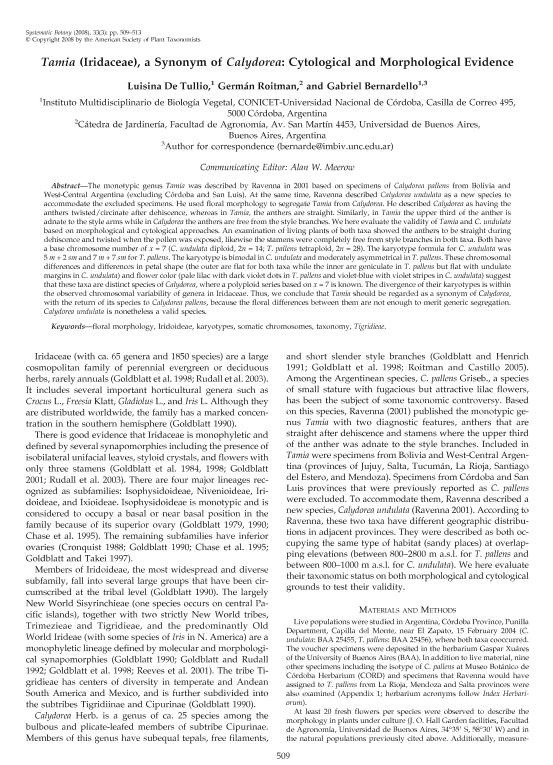Mostrar el registro sencillo del ítem
dc.contributor.author
de Tullio, Luisina

dc.contributor.author
Roitman, Germán
dc.contributor.author
Bernardello, Gabriel Luis Mario

dc.date.available
2017-11-24T17:37:36Z
dc.date.issued
2008-07
dc.identifier.citation
de Tullio, Luisina; Roitman, Germán; Bernardello, Gabriel Luis Mario; Tamia (Iridaceae), a synonym of Calydorea: cytological and morphological evidence; American Society of Plant Taxonomists; Systematic Botany; 33; 3; 7-2008; 509-513
dc.identifier.issn
0363-6445
dc.identifier.uri
http://hdl.handle.net/11336/29032
dc.description.abstract
The monotypic genus Tamia was described by Ravenna in 2001 based on specimens of Calydorea pallens from Bolivia and West-Central Argentina (excluding Córdoba and San Luis). At the same time, Ravenna described Calydorea undulata as a new species to accommodate the excluded specimens. He used floral morphology to segregate Tamia from Calydorea. He described Calydorea as having the anthers twisted/circinate after dehiscence, whereas in Tamia, the anthers are straight. Similarly, in Tamia the upper third of the anther is adnate to the style arms while in Calydorea the anthers are free from the style branches. We here evaluate the validity of Tamia and C. undulata based on morphological and cytological approaches. An examination of living plants of both taxa showed the anthers to be straight during dehiscence and twisted when the pollen was exposed, likewise the stamens were completely free from style branches in both taxa. Both have a base chromosome number of x =7(C. undulata diploid, 2n = 14; T. pallens tetraploid, 2n = 28). The karyotype formula for C. undulata was 5 m + 2 sm and 7 m + 7 sm for T. pallens. The karyotype is bimodal in C. undulata and moderately asymmetrical in T. pallens. These chromosomal differences and differences in petal shape (the outer are flat for both taxa while the inner are geniculate in T. pallens but flat with undulate margins in C. undulata) and flower color (pale lilac with dark violet dots in T. pallens and violet-blue with violet stripes in C. undulata) suggest that these taxa are distinct species of Calydorea, where a polyploid series based on x = 7 is known. The divergence of their karyotypes is within the observed chromosomal variability of genera in Iridaceae. Thus, we conclude that Tamia should be regarded as a synonym of Calydorea, with the return of its species to Calydorea pallens, because the floral differences between them are not enough to merit generic segregation. Calydorea undulata is nonetheless a valid species.
dc.format
application/pdf
dc.language.iso
eng
dc.publisher
American Society of Plant Taxonomists

dc.rights
info:eu-repo/semantics/openAccess
dc.rights.uri
https://creativecommons.org/licenses/by-nc-sa/2.5/ar/
dc.subject
Floral Morphology
dc.subject
Iridoideae
dc.subject
Karyotypes
dc.subject
Somatic Chromosomes
dc.subject.classification
Ciencias de las Plantas, Botánica

dc.subject.classification
Ciencias Biológicas

dc.subject.classification
CIENCIAS NATURALES Y EXACTAS

dc.title
Tamia (Iridaceae), a synonym of Calydorea: cytological and morphological evidence
dc.type
info:eu-repo/semantics/article
dc.type
info:ar-repo/semantics/artículo
dc.type
info:eu-repo/semantics/publishedVersion
dc.date.updated
2017-10-19T20:42:24Z
dc.journal.volume
33
dc.journal.number
3
dc.journal.pagination
509-513
dc.journal.pais
Estados Unidos

dc.journal.ciudad
Washington
dc.description.fil
Fil: de Tullio, Luisina. Consejo Nacional de Investigaciones Científicas y Técnicas. Centro Científico Tecnológico Conicet - Córdoba. Instituto Multidisciplinario de Biología Vegetal. Universidad Nacional de Córdoba. Facultad de Ciencias Exactas Físicas y Naturales. Instituto Multidisciplinario de Biología Vegetal; Argentina
dc.description.fil
Fil: Roitman, Germán. Universidad de Buenos Aires; Argentina
dc.description.fil
Fil: Bernardello, Gabriel Luis Mario. Consejo Nacional de Investigaciones Científicas y Técnicas. Centro Científico Tecnológico Conicet - Córdoba. Instituto Multidisciplinario de Biología Vegetal. Universidad Nacional de Córdoba. Facultad de Ciencias Exactas Físicas y Naturales. Instituto Multidisciplinario de Biología Vegetal; Argentina
dc.journal.title
Systematic Botany

dc.relation.alternativeid
info:eu-repo/semantics/altIdentifier/url/http://www.bioone.org/doi/abs/10.1600/036364408785679798?journalCode=sbot
dc.relation.alternativeid
info:eu-repo/semantics/altIdentifier/doi/http://dx.doi.org/10.1600/036364408785679798
Archivos asociados
